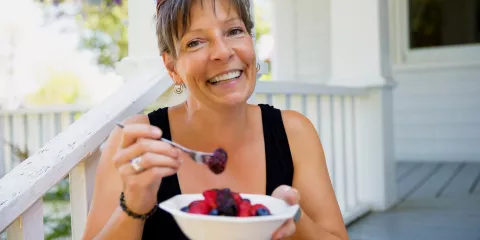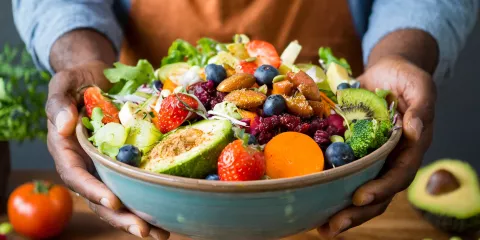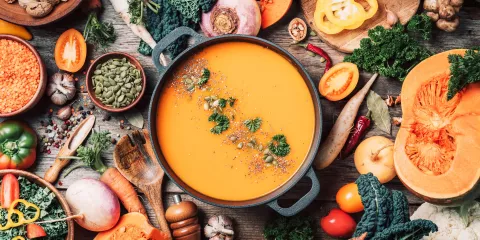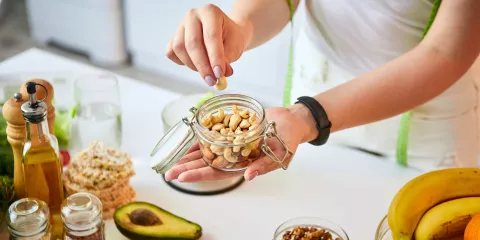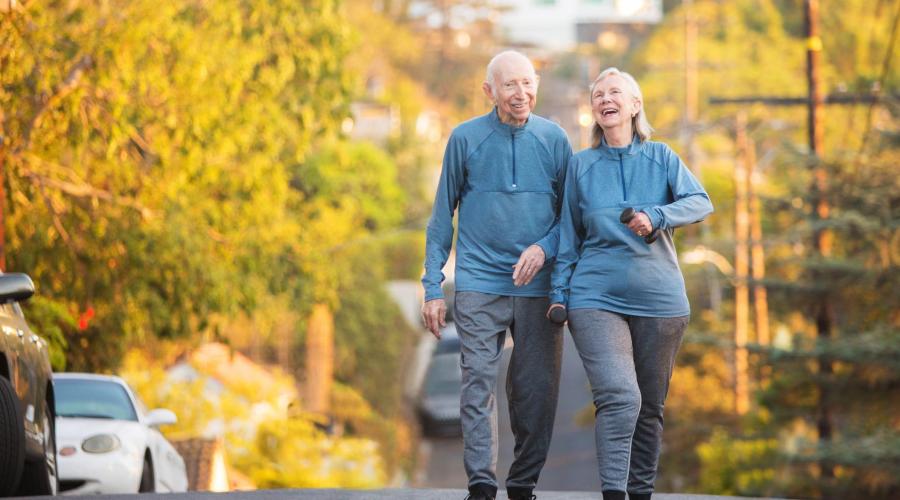
It’s never too late to lose weight. It’s true that as you get older, maintaining a healthy weight can get trickier. But it’s still a worthwhile goal at any age. Here’s our advice for how to lose weight for older adults:
Move your body
Once you’re “over the hill,” you may have more aches and pains than you used to. Our bodies are aging, after all. And that pain (and wanting to prevent more) makes you avoid exercise. But just because it hurts to move doesn’t mean you shouldn’t!
In fact, it’s quite the opposite. According to the Arthritis Foundation, “Exercise is considered the most effective non-drug treatment for reducing pain and improving movement.
It’s important for your cardiovascular, joint and overall physical health that you move your body as you get older. One easy way to start exercising: Check out our Get-Moving Walking Plan for Beginners. (As always, consult your doctor before beginning an exercise program to make sure you’re doing what’s best for your body.)
Stay strong
The older you get, the more crucial it is that you incorporate strength training into your regular exercise routine. Strength training can not only help improve your muscle strength, but can also improve your mobility and increase bone density — and it’s a great way to slim down
Losing weight can greatly benefit older adults with arthritis, as it eases the pressure (and as a result, the pain!) on your joints. With regular strengthening exercises, you can lose the extra pounds and help yourself move and feel better [1].
Hydrate
If you want to lose weight at any age, it’s important you hydrate. That’s because thirst commonly masks itself as hunger. When you first feel hungry, try drinking a large glass of water to determine if you’re actually hungry, or if your body is just craving more water.
How much water should you drink, you ask? Divide your body weight in half to get the number of ounces of water you should drink. For example, if you weigh 150 pounds, you should be drinking 75 ounces of water each day. We know that’s a lot of H20, so take a look at our five ways to encourage yourself to drink more water
Practice meal planning
One way older adults can encourage weight loss is by meal planning. With the kids out of the house and less people to cook for, many people over 50 frequently eat out, which means they’re consuming more high-fat and processed foods.
By planning your meals each week, you can avoid the pitfalls of eating out, save some money, and stay on track with your diet. The first step to meal planning? Making a healthy grocery shopping plan.
Eat healthy foods
It’s true that you are what you eat. Weight loss is generally 75 percent diet and 25 percent exercise [2], so if you want to lose weight and be healthy, you need to eat healthy foods.
When it comes to diet, older adults wanting to lose weight should:
- Eat whole foods:
In general, the fewer ingredients a food contains, the better it is for your health and weight.
- Don’t skip meals:
Skipping meals can negatively affect your metabolism. It’s important that older adults eat regularly throughout the day, as consuming the protein and calories your body needs will help increase its energy levels, maintain muscle mass, and, as a result, have a higher metabolism
- Try some healthy food swaps:
You can avoid consuming excess saturated fats and empty calories by swapping out not-so-healthy foods for heart-healthier alternatives.
- Forget about low-fat foods:
Low fat foods typically have higher levels of sugar to compensate for a lack of flavor. If you want to lose weight, you should avoid low-fat foods.
You might not be burning calories like you did when you were in your 20s, but you can still lose those extra pounds, move easier, and help yourself feel better as you age. Ready to focus on your health? Check out our five time-tested rules for aging well.
References:
[2] https://www.huffpost.com/entry/exercise-vs-diet-for-weight-loss_n_5207271
